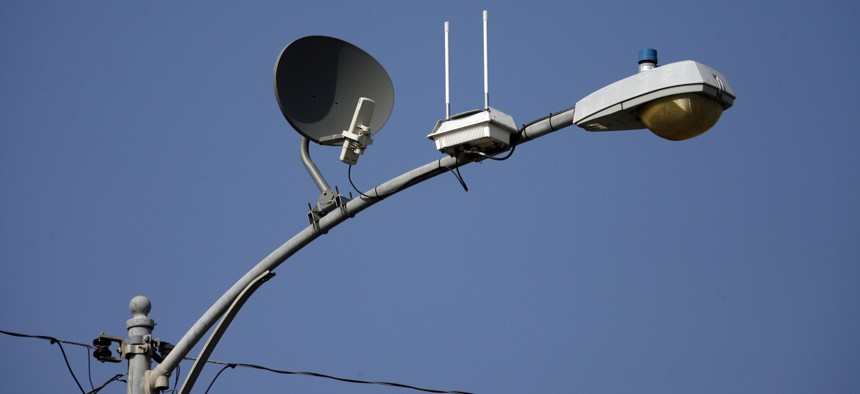Connecting state and local government leaders
New York cities plan to deploy smart technology, from optic scanners to weather sensors, when they retrofit street lights to make them more energy efficient.
A New York initiative to retrofit street lights across the state with energy-efficient LED technology is shining a light on more than just cost savings.
As cities embark on light replacement campaigns, many are simultaneously experimenting with smart technology that can be attached to utility poles and used to collect data on everything from traffic patterns to snow accumulation.
Syracuse, which announced its plan to purchase and retrofit 18,000 streetlights from the National Grid utility company last year, began the process of retrofitting LED lights and installing light control sensors this month, according to Sam Edelstein, the city’s chief data officer. The sensors will allow city officials to control street lights' brightness and receive alerts when the lights go out. Syracuse lawmakers approved $38 million bond financing for the project. Once the streetlight conversion is complete, Syracuse Mayor Ben Walsh said the city is expected to save $3 million annually.
But along with the retrofitting process, the city is also examining other types of smart technology that could be attached to the newly acquired utility poles and feed into broader smart technology initiatives.
“As we are deploying this technology, we are doing so to enhance the level of services we are providing,” Walsh said during a presentation last week in Washington, D.C. on the city’s streetlight plan.
Numerous data collection options are under consideration, including sensors that can collect data on weather and road conditions or detect rising flood waters.
Explaining one potential use, Edelstein described flooding conditions at a local creek. Heavy rains or snow melt can lead to flooding and closure of a walking path that follows the creek.
“Right now, when it floods we send an engineer to go check if it is flooding, so that’s depending on staff time, remembering to check it,” Edelstein said. “If we can automate those things it’s a savings and better for safety generally.”
The New York State Assembly passed legislation in 2015 that opened the door for municipalities to apply for a transfer of ownership of utility-owned streetlights. The legislation helped jumpstart initiatives to make lighting more energy efficient and gave municipalities the leeway to explore other smart technology, Edelstein said.
New York Governor Andrew Cuomo in 2018 announced his goal to replace at least 500,000 streetlights throughout the state with energy-efficient LED bulbs. As of April, the New York State Public Service Commission had approved the sale of nearly 45,000 street lights to 18 municipalities.
Similar to Syracuse, Schenectady, New York also has an LED conversion and pilot project underway. Both Walsh and Schenectady Mayor Gary McCarthy and spoke about their city’s streetlight projects at the Smart and Secure Cities and Communities Challenge Expo in Washington, D.C. last week.
Unlike Syracuse, however, Schenectady did not acquire its utility poles. Instead the city is partnering with a utility company and using grant money as part of a state-led Reforming the Energy Vision demonstration project meant to test energy savings from a large-scale LED deployment.
Approximately 4,200 street lights owned by the National Grid utility company will be replaced with LED lights that will be retrofitted with controls and smart technologies. McCarthy said different vendors will provide the lights and monitoring technology so the city and utility can compare and contrast their functionality. He expects the city will save at least $300,000 annually through the LED light conversion.
The city is expected to contribute approximately $5 million in funding for the project, with National Grid contributing about $7 million and grants covering another $1 million, McCarthy said.
Other smart sensor nodes will also be attached to the utility poles as the retrofitting gets underway. Schenectady is still considering which technology to deploy, but McCarthy said it could include optic or environmental scanners that can pick up visual and weather data, as well as infrastructure to support wireless internet connectivity and 5G broadband deployment.
McCarthy acknowledged that the use of any optical or camera equipment would come with privacy concerns that the city would need to vet with residents.
Keeping an open mind about the possibilities of the technology will be important throughout the deployment, McCarthy said, adding that the city may gain new insights about how to improve city services through the data collection.
Utility companies might not initially be interested in environmental data but it could be used to predict spikes in electricity usage, he said.
“You don’t think initially it would be of interest to one party,” McCarthy said. “But there’s going to be some days every year when the utility wants to know how fast the temperature is going up in a specific location because their demand for electrons is going to go up in an hour.”
Edelstein said Syracuse was similarly looking forward to gathering new types of data through the sensors and putting it to use to improve city services.
“Let’s figure out places there is a gap in how we deliver the service and is there technology that can help us monitor things better,” Edelstein said.
Andrea Noble is a staff correspondent for Route Fifty.

NEXT STORY: Blockchain news: NIST's new taxonomy, digital resumes in Canada, state initiatives



